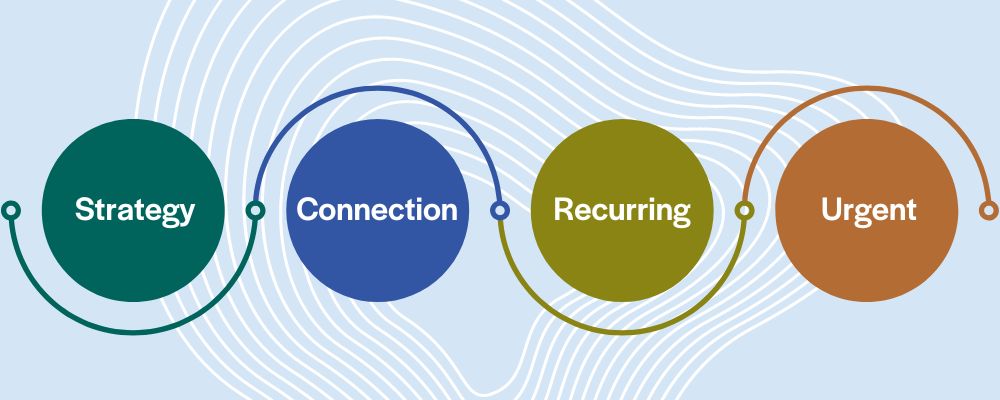The Importance of Delegation
Jeremie Miller, August 7, 2024
(and how to do it)
How often, at the end of the day, do you sit back with a content sigh and say to yourself:
“Ahhhh, I got all the important tasks done today.”
As a leader in your organization your answer is most likely something similar to:
“Ha! Not a chance. I’m not even sure what I got done today.”
OR
“All I did was put out fires, I never even made it to my task list.”
(Important note: if you are feeling this way as the leader of your organization, chances are the people on your team are feeling the exact same way)
Too often it feels like there is just too much happening to fulfill your many roles as a leader and do all the things leaders need to be doing.

Prioritizing Tasks as a Leader
(My mentor, Charlie Gilkey calls this the leadership logjam. I have added the category of “connection” to his original work. You can read more of Charlie’s work at www.betterteamhabits.com )
Every organization can break its different projects and tasks into four broad categories:
Strategy – Connection – Recurring – Urgent
Strategy: this is your longer-term work that guides the direction of your organization and provides the structure for the other three cateogries. Strategy work may not have an immediate payoff (which is why it can feel easy to delay) but is important to everything happening in your organization. Strategic plans (yearly or multi-year), quarterly and monthly planning, finding new funding, human resources, organizational structure, creative work, program review/change, new projects, networking, and many other activities fall into the strategy category.
Connection: this is (in my opinion) the most important leadership work you can do. This category is all about communication with your team and building a positive culture in your organization. Meetings, getting to know your team, coaching, team building, transparency, policies, trauma informed systems, DEI and Belonging all fall under this category.
Recurring: these are all the tasks and systems that your organization completes on a regular basis. Program delivery, grant applications and reporting, payroll, board meetings, resource delivery, hotline calls, court visits, shelter taskes, etc. Tasks in this category are where many leaders get stuck, and are a great first place to look for delegation opportunities.
Urgent: time sensitive and important, often involving safety concerns, these are tasks that need to be done as soon as they arise. Hotline calls, hospital visits, active abuse situations, assault call outs, suicide calls, etc. This is an important list of tasks, but in many cases organizations end up with tasks on this list that aren’t truly urgent, but have become an urgent part of the organization’s culture over time. Discovering which tasks can be moved out of the urgency category, and then delegating those tasks is another great place to start freeing up your time.
Four categories of delegation

Prioritizing your leadership work
As a leader you must organize, prioritize, and complete tasks in all four of these categories. Ideally, you want to prioritize the strategy and connection categories. Strategy and connection are the important leadership tasks that keep your organization on track and your team culture healthy.
You will still have recurring tasks on your list, and sometimes need to join your team in dealing with urgent tasks, but you don’t want these types of tasks to dominate your time. However, your organization is a busy place with a wide variety of tasks taking place all at once. In practice it is these recurring and urgent tasks that end up being prioritized over the strategy and connection work.
You end up getting stuck on the right side of the priority list, feel like you are never getting anything done, and struggling to find a way to do the important work on the left side of the list.
So, how do you shift away from getting stuck focusing on recurring and urgent tasks, and return more of your time and focus to doing your important strategy and connection work?
You need to get better at delegating.
Shift to the left with the four categories of delegation
(Big thanks again to Charlie Gilkey as these delegation categories are adapted from work I have done with him. I have added “Don’t do it, I have to do it” to Charlie’s work)
Strategy – Connection – Recurring – Urgent
Your delegation goal as a leader is to find ways to shift the time you spend each day to the left of this priority list. Time spent on strategic, and especially on connection activities will benefit the people in your organization across the board. One great way to start this shift is by using the four categories of delegation:
- Don’t do it, I have to do it.
- Don’t do it, until you tell me.
- Do it, then tell me.
- Do it, and don’t tell me.
Let’s take a closer look at the four categories of delegation:
Don’t do it, I have to do it – these are tasks that, for whatever reason, only you can do, or that you want to do. Paperwork only you can complete and sign, meetings only you can attend, putting together a project or strategic plan (though including others in this is valuable), employee reviews, and tasks and projects that you enjoy or want to do are examples of this category of delegation. These tend to be tasks that fall into the strategy and connection side of the priority list. When you are doing these tasks you are working on the bigger picture of the organization. Shifting tasks from this category to the “Don’t do it, until you tell me” is a great way to show trust and grow the leadership skills of others in your organization.
Don’t do it, until you tell me – these are tasks that other people can do, but you need to approve them doing it before they begin. This could be a new program implementation, sending in the final grant report, meeting with a city official, making a decision about a client, switching shifts. etc. The size of tasks in this category can vary greatly, but you need to be part of the decision-making process, or you need to give the final “yes”. Shifting tasks from this category to the “Do it, and tell me” category can free up a lot of your time and remove you as the bottleneck in your systems.
Do it, then tell me – these are tasks others need to do and let you know they have been done, but they don’t need to let you know beforehand. You need to receive a report about these tasks, or know they have been done so you can move onto next steps. Or you may just need to know they are done so you have piece of mind. The more you get comfortable with delegation the more tasks you can usually put into this category, especially if they are recurring tasks in your organization. Program management/evaluation, grant reporting, quarterly reports, budget requests, etc. may fall into this category. Receiving a report instead of being involved in all the steps of the process will free up your time. Shifting important recurring tasks to this category can be a great delegation “baby step” if you aren’t feeling ready for the last delegation category.
Do it, and don’t tell me – these are all the day-to-day, recurring, everyone does them all the time tasks that you don’t need to know are happening. You don’t even need to know how they are happening as long as they are getting done. If things are running smoothly you need to trust your team and trust that these tasks are being finished. If you are a micromanager you are probably spending way too much time being involved in these tasks. Programs, intakes, paperwork, cleaning, and even larger tasks like grant reporting (eventually as you get more comfortable delegating) fall into this category. Trusting your team and staying out of these tasks will not only free up your time but also improve relationships as your team won’t feel like you don’t trust them to get the job done.
Urgent tasks – all of these categories can fall apart when something urgent is happening and you need all hands on deck. When something is urgent you may be the only one able to do it. Something that your normally don’t need to sign off on may now need your involvement. Or you may need to support your team by helping with the most basic of tasks. Two things to remember when things are urgent:
- Make sure your organization is clear on what is truly urgent. Over time many non-urgent tasks can become urgent as part of the organizational culture. Moving these types of tasks out of the urgent bucket is a healthy step for all organizations.
- Remember to trust your team in the time of crisis. There will be tasks that you may want to do in the emergency but aren’t necessary for you to do. And, if you step in you will be stepping on other people’s toes, or showing your team that you don’t trust them.
Putting Delegation into practice
Here are some suggested approaches for getting started with delegating:
- Have a conversation with the people you interact with the most in the organization in your leadership role (there are usually 6-8 people in this group), and have a discussion with them about their different projects and tasks and put them into the four categories of delegation so they are clear on what they can do on their own, and when they need to involve you.
- Write down all the tasks that you are busy doing each day or week that you know you shouldn’t be doing. Pick one of the easiest ones to delegate and have a meeting with the person that should be doing that task to empower them to complete that task now.
- Introduce this idea at a staff meeting and ask everyone to write out the tasks they complete and organize them in the four categories of delegation. Then have your leadership team review the results and make sure everyone has the same expectations.
- Make a list of the strategy and connection projects and tasks on your list and use that list to help motivate you to start delegating.
Delegation Tip: if you are feeling hesitant to get started, try to focus on shifting tasks only one step along the delegation categories. Moving something from “Don’t do it, I have to do it” all the way to “Do it and don’t tell me” is a big, and possibly scary step. Start with smaller changes so you can see the power of delegation working.
Conclusion
Delegating isn’t easy. As a leader you are effective at a lot of different tasks in your organization. You can do a lot of tasks faster than other people. You feel relieved in knowing that tasks are completed.
However, none of those are great reasons for you to be doing those tasks. Getting clear on what you need to be doing, and what others can be doing, then delegating those tasks out is going to help you shift to the left of your priority list and get more of your important work done.
The sooner you get started delegating, the sooner your team can be doing the work they need to be doing, while you are completing your most important projects and tasks for the organization.







